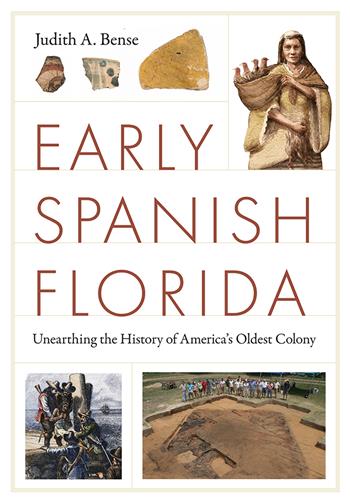Early Spanish Florida
Unearthing the History of America's Oldest Colony
Judith A. Bense
Paper: $32.00
Available for pre-order. This book will be available March, 2026
A leading authority on the archaeology of Florida tells the story of the state’s past as a Spanish colony
“Veteran archaeologist Judith Bense offers us an approachable, lucid summary of a period that has intrigued those with an interest in Florida’s storied past for generations. Drawing on her command of Florida’s rich archaeological record, Bense reveals what life was like for Spaniards, Native Americans, and Africans alike in engrossing prose.”—Mike Bunn, author of Fourteenth Colony: The Forgotten Story of the Gulf South During America’s Revolutionary Era
“In this engagingly written and nicely illustrated book, Bense sifts through over five centuries of La Florida’s history, drawing from historical documents and archaeological discoveries to uncover Spanish interactions with Native Americans, African Americans, and other European powers—interactions that played an essential role in shaping the Florida we recognize today.”—Amanda Hall, collection manager for Florida archaeology, Florida Museum of Natural History
“This book brings to light the successes and failures of early European exploration and colonial efforts between 1513 and 1763 and their devastating impacts on Florida’s Indigenous peoples.”—Rochelle A. Marrinan, coeditor of Unearthing the Missions of Spanish Florida
Florida is the state with the oldest recorded history of European contact, beginning with the arrival of Spanish explorer Juan Ponce de León more than five centuries ago—but many people don’t know the full story of Florida during this momentous time. Engagingly written and extensively illustrated, Early Spanish Florida delves into archaeological discoveries to uncover the 250-year history of Spanish colonization on the peninsula.
Judith Bense, a lifelong archaeologist and expert on Spanish Florida, traces the story from 1513 when Ponce de León accidentally landed on “La Florida” to 1763 when Spain lost the land to Britain after the Seven Years’ War. Bense explores how the first Spanish settlers tried to colonize Florida with aims to take over the entire Southeast, encountering harsh weather, competing colonizing nations, and Native resistance. The story includes the establishment of St. Augustine in 1565, shipwrecks of early explorers and colonists, the building of Catholic missions in the 1600s, and the journeys of people of African descent escaping slavery on northern plantations.
The events in Early Spanish Florida are told from the perspectives of the intertwined groups of people whose interactions created deep cultural changes, including Spanish, Indigenous, and African communities. Filled with maps and images of artifacts, excavations, historical sites, and original documents, and featuring suggested readings and places to visit, this book offers a wealth of knowledge and sparks enduring interest in Florida’s past.
Judith A. Bense is president emerita and professor of anthropology at the University of West Florida. Bense is the author of many books, including Unearthing Pensacola and Presidios of Spanish West Florida, winner of the Southern Anthropological Society James Mooney Award. She is the founder of the Florida Public Archaeology Network (FPAN).
Funding for this publication was provided through a grant from Florida Humanities with funds from the National Endowment for the Humanities. Any views, findings, conclusions, or recommendations expressed in this publication do not necessarily represent those of Florida Humanities or the National Endowment for the Humanities.
No Sample Chapter Available
There are currently no reviews available












